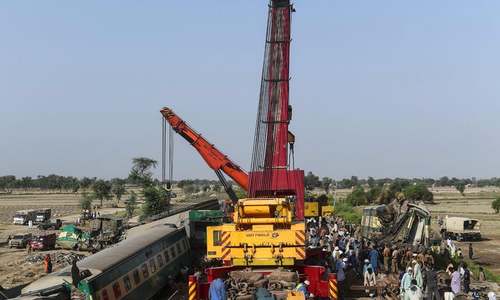HYDERABAD: As Pakistan Railways probes the June 7 tragedy in Daharki, multiple correspondences by divisional superintendent of PR Sukkur division show the officer had repeatedly raised the issue of “terrible” condition of tracks in his division before higher authorities concerned well before the disaster hit.
Sixty-five people lost their lives and over 100 others suffered injuries in a pre-dawn collision between Sargodha-bound Millat and Sir Syed trains near Daharki railway station.
The accident occurred after several bogies of Millat train disengaged from the train and fell on down-country track and Sir Syed train coming on upcountry track rammed into them.
Sukkur division superintendent Tariq Latif’s letters, available with Dawn, which were sent in quick succession to PR authorities point out issues confronting tracks’ condition, unwilling permanent way staff, lack of human resource, machinery and ‘missing’ staff in the division.
He had faced severe criticism from PR management for speaking to media following the tragedy as he had told television channels and correspondents that he had already cautioned authorities against the danger and sought rehabilitation of tracks.
Surprisingly, the officer in his April 7, 2021 letter addressed (in the wake of derailment of Karachi Express’s coaches near Mando Dero on March 3) to the FGIR stated he (FIGR) harboured grudge against him for reporting against him about purchase of material for railway stations’ establishment.
FGIR Farrukh Taimoor arrived at Daharki railway station and then visited Sukkur railway station on Wednesday in connection with the inquiry. FGIR’s team, which conducted inquiries into train accidents, would carry out the probe on June 16-18.
The superintendent’s last letter dated May 26 was addressed to chief executive officer (CEO) of PR in which he mentioned “during inspection ever since taking over the charge he had found the track in a dilapidated state”.
The letter said: “Running was found very much rough, oscillatory, jerky, bumpy, camel riding and fittings, fastenings, joint bolts, fish plates were found missing and loosely packed and not tightened properly.”
He explained that it depicted the track was not maintained as per required standard specification, track geometry and way and works manual. “God forbid, any eventuality may take place. It reflects permanent way subordinate staff is not taking interest in performance of their duties properly although they have been reprimanded time and again and served with show-cause notices and explanation calls”.
He said: “They have lost interest in their work and have ceased to be efficient employees as they have been posted in this division since decades”.
Concluding the letter he sought intervention of CEO in “this important safety related issue. Existing permanent way subordinates may be replaced with experienced and skilled ones to ensure proper maintenance of the track, safe train operation and avoidance of any incident on this account”.
On May 24, the officer drew the CEO’s attention towards “dearth of operational officers and officials and staff of essential categories in Sukkur division that is adversely affecting performance, punctuality and safety of trains.
“Sukkur division has concentration of work during night. Human resource at least in essential categories of the division highlighted earlier has to be as per sanctioned strength,” he said.
He requested filling essential operational vacancies on priority as this state of affairs had rendered the division vulnerable and said “it was difficult, if not impossible, to ensure punctuality, safety and routine administrative work”.
He went on to state: “If any operational hazard takes place, its responsibility will rest with headquarters office in Lahore as posts of 10 permanent ways inspectors (PWIs) grade-II, two PWIs in grade-I and 11 AWIs are vacant and ‘condition of the track is terrible.”
Rehabilitation of tracks urged
Earlier on March 11, 2021, while referring to his previous letters of February and November last year, the officer submitted to CEO that “in view of safety of train operation, it is again suggested that a comprehensive plan for rehabilitation of track infrastructure may be prepared so as to ensure safe train operation, efficiency of department and to avoid any incident on this account”.
About the rails, he mentioned that the rails mostly laid between 1962 and 1989 on main line had outlived their useful track life and needed urgent replacement. Mostly sleepers had also outlived their usefulness as they were laid in 1964-1984, he said.
Citing major issues, he said, “high capacity wagons and increase in frequency of trains have reduced maintenance time and is affecting track infrastructure. Old aged track infrastructure needs complete renewal on entire section”.
Meanwhile, PR authorities have not yet come forward to register FIR of the tragedy. In response to police’s communication about the case, divisional transportation officer Sukkur, Sajjad Ahmed Wagho, sought guidance from PR CEO for registration of FIR.
No FIR has been lodged but Ghotki police have deputed two SHOs of police stations Raiti and Khenjo along with DSP of Ubauro to appear before the FGIR’s team in connection with the June 7 incident. The SHOs and DSP were involved in relief operation at the site.
The FGIR, however, was not available for comments.
Published in Dawn, June 17th, 2021













































